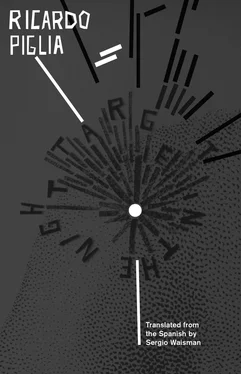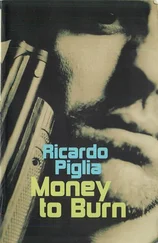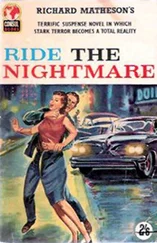Yoshio felt sick, he heard voices and singing because he’d suddenly stopped smoking opium. He remembered the pipe he’d calmly prepared and smoked, laying on his tatami that last morning. He’d fallen asleep to the quiet sweetness of the flame burning on the tip of the bamboo pipe. When you’re on the drug, giving it up seems easy, but when you’re sick with withdrawal, your entire body burns and you’ll do anything for it. Had he been able to reduce his whole life down to a single decision, it would be to quit the drug. He wasn’t an addict, but he couldn’t quit. He was afraid they’d tempt him by promising him a fix and forcing him to sign the confession that the Prosecutor had shown him several times. It was already written out, it said that he confessed to killing Durán. He was able to get codeine pills in the prison, he took them whenever he felt as if he were dying. It was like a burning, although the word didn’t do justice to the pain. He was obsessed with the thought that his father might think that his job at the hotel was a woman’s job, that he’d betrayed the traditions of his race. His father had died a hero. He, on the other hand, was lying in that pit, moaning because he did not have his opium. If he’d done his job dressed as a woman, he thought all of a sudden, maybe they wouldn’t have accused him and he wouldn’t be in jail now. He could see himself dressed in a blue kimono with red flowers, rice powder on his face, his eyebrows plucked, taking small, little steps as he slid down the hallways of the hotel.
Tony’s death hurt Yoshio more than his own fate. An owner next door , he heard the man singing in the distance. The neighbor next door / they killed one of his workers / they put the blame on me / and did me in at the trial . Everyone in jail was innocent. That’s why Yoshio refused to speak with the other prisoners. He’d had his visit by the court-appointed lawyer assigned to his defense. One afternoon they took him from his cell and escorted him to the office of the prison warden. The lawyer — a fat, unshaven, dirty-looking man — didn’t bother to take a seat, he seemed in a hurry to tend to other, more important matters. Yoshio, handcuffed, wearing prison garb, listened, dispirited. “Look, mister, it’ll be better for you if you make a deal and accept the terms, your sentence will be shorter that way. This is the offer from the Prosecutor’s office. If you sign, you’ll be out in a few years, otherwise they’ll accuse you of premeditated murder and intended malice, and you’ll get stuck with life. There’s not much choice in the matter, all the evidence and the witnesses are against you. It won’t be much fun for you if you don’t make a deal, my dear.” He was telling him for his own good, but Yoshio refused. So he was sent to a block with prisoners awaiting their sentences, and of course no one had done anything more since he’d been put in there. And now he was in hell, waiting, hearing the voice of someone who seemed to be singing in a dream. A prisoner doesn’t know which way / the scales will tip, / but waiting makes no sense / this much I know: / any man who enters here / leaves all hope behind…
Yoshio lit a match and with the match he lit a candle resting on a tin jar. The light flickered off and back again. In the semi-darkness he searched for a small hand-mirror, a woman’s item that they let him keep on the pretext that he needed to shave, although he never needed to shave. He had it for his secret vices. Lying on the bed, he looked at his lips in the mirror. A small, womanly mouth. He began to masturbate, looking at himself. He moved the image very slowly. His face reflected back to him in fragments, white skin, plucked eyebrows, he stopped on his ice-cold eyes. He barely needed to touch himself, he felt as if another were looking at him, devoted, servile…
“We barely saw them until we finished high school, because by that point they’d already opened the factory and it was far away from town, and we’d gone to study in La Plata. That was in 1962. My grandfather used part of his wealth to buy the land, near the provincial highway, in an area that wasn’t anything then, but it’s worth a fortune now. My grandfather died before the factory was finished, my brother kept building and working as if he was keeping a promise to a dead man.
“Right away they started making money, growing and expanding, towards the end they had almost a hundred workers at the plant, they paid the best wages in the Province, the Belladona Brothers. They went to Cincinnati to buy some expensive machinery, the latest of the latest, and that was the beginning of the end. Suddenly everything started to collapse, the government devalued the peso, the economic policies drastically changed course. The interest on their debts in dollars became impossible, and my father, to save him, as he said, took a shortcut, he tricked one of his own sons, I should say. To save the investment — again, as he said — my father convinced Lucio to set up a public corporation and to negotiate away the preferred stocks, until my brother lost control of the company. One night my brother came to the house with a gun, looking for my father, he wanted to kill him.”
“Yes, yes. I heard about that.”
“He was blind with anger,” Sofía said. “He was looking for my father, he wanted to kill him,” she repeated, and got up again and walked around the balcony, anxiously. “He howled like a hungry wolf, poor thing… 22
“Some men,” she went on, “can survive anything, the worst catastrophes, any suffering, you could say, because they have an absolute conviction and an unbelievable amount of sympathy. A light deep in their eyes that shines on everyone around them, an ability to inspire feeling — no, no, it’s not feeling. Understanding. That’s how Luca is. Anyone else who’d faced what my brother had to face would have caved in, but not him. It’s something else, he’s obsessed, he can block out the world and keep pursuing the light of perfection until in the end, eventually, he hits up against reality. Because reality is what muzzles you,” she said. “Reality waits for you and reins you in. Luca got into debt, he took a mortgage out on the plant, but he didn’t let them sell the factory. He fought against bankruptcy, he started doing whatever he could.”
“He shut himself up in the factory.”
“He went to live in the factory — it was the light of all his illusions, his hope for survival — and he never came out again.”

22 Croce found Luca crouched next to the closed gate outside the large Belladona house, waiting for the right moment to go in and kill his father. The Old Man had turned the outside lights on, locked all the doors, and called the police. The Inspector went up to Luca, very relaxed, as if he was just running into him by chance. Even though he was very wound up, Luca was so respectful and so polite that he said hello to the Inspector and started talking to him about lost oxen, one hand behind his back, hiding the gun. You’re going to keep fighting with him, whether you kill him or not , Croce said to him all of a sudden. Before long he’d talked him down. Luca wanted to hand the gun over to Croce, but the Inspector told him that it wasn’t necessary. Whether or not you give me the gun now, you can still kill him later . The two hypotheticals that Croce mentioned and his show of trust were enough to finish calming Luca down. He got back in his car and nervously backed away from the house. When he drove by the lake Luca threw the gun in the water, “so he wouldn’t be tempted by the Devil.”
Читать дальше













